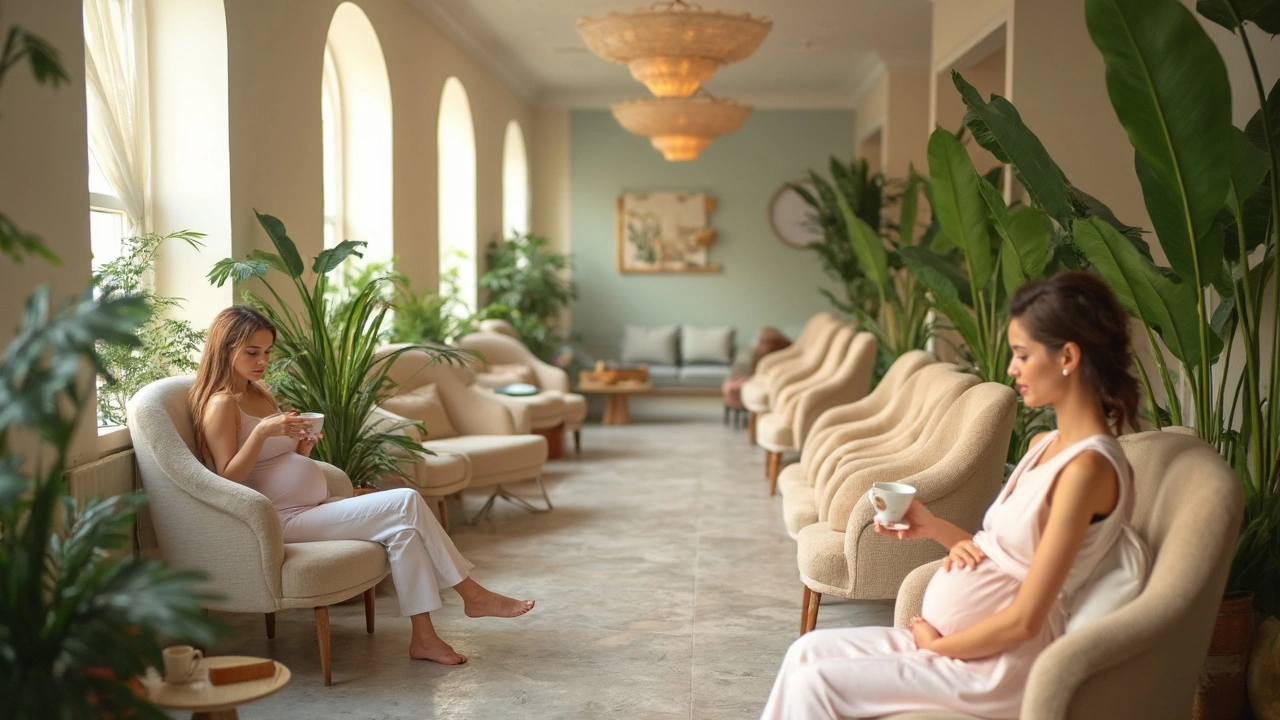Ever tried getting comfy on your couch while pregnant? Now imagine actually relaxing—on a massage table—while someone trained knows exactly where the knots are and how to safely ease your aches. That’s what pregnancy massage is all about. It’s not just a regular backrub. These sessions are tailored for mums-to-be, with positions and techniques that work with your bump, never against it.
Lots of Londoners are turning to pregnancy massage because it helps with the classic pregnancy complaints: sore backs, swollen legs, sleep struggles, and that restless feeling you can’t quite shake. Therapists use gentle, safe movements meant to soothe—not trigger contractions or discomfort. Plus, research out of King’s College London shows many pregnant women report less anxiety and improved sleep after just a few sessions. If you’re after a break that actually helps your body, this is the gold standard.
- What Is Pregnancy Massage, Really?
- Benefits and Safety—What You Need to Know
- Top-Rated Pregnancy Massage Spots in London
- How to Choose the Right Therapist
- Booking Tips and What to Expect
- FAQs and Expert Advice
What Is Pregnancy Massage, Really?
A pregnancy massage (or prenatal massage) is a hands-on therapy made just for expectant mums. It’s not the same as your typical Swedish massage. Therapists work with special positions and cushions—usually side-lying or with a pregnancy pillow—to keep both you and your baby safe and comfy. No lying flat on your back here after the first trimester, since that can put pressure on blood vessels you really don’t want compressed.
What makes a pregnancy massage London experience different? Therapists use gentle to moderate pressure, and avoid deep tissue work on your belly, legs, or anywhere varicose veins may form. Sessions usually focus on areas most affected by pregnancy: lower back, hips, shoulders, and legs.
According to the NHS, massage is considered safe if done by someone specifically trained in pregnancy care. While you’re often asked to wait until the end of your first trimester (about 12 weeks), some places are okay with earlier sessions if you get a green light from your midwife or GP. The main thing is having a therapist who understands the dos and don’ts.
“Properly performed, prenatal massage is not only relaxing but has been shown to reduce muscle tension and stress hormones—both of which benefit mother and baby.” – Royal College of Midwives
So what can you expect on the table? Here’s what usually comes with a quality prenatal massage:
- Supportive bolsters or pillows for bump and legs
- Softer, lighter strokes—especially near joints and sensitive spots
- Special attention to swollen feet and tired lower backs
- No pressure on deep veins or your tummy
Fun fact: Recent figures show that nearly 1 in 4 pregnant women in London now seek out a specialist pregnancy massage at least once during pregnancy, with a big boost in the second and third trimesters. It’s that popular, and for good reason—the difference in comfort is hard to beat.
Benefits and Safety—What You Need to Know
It’s totally normal to wonder if a pregnancy massage London experience is really safe, or if it actually makes a difference. Here’s what we know: done by a certified prenatal therapist, pregnancy massages are not just safe—they’re packed with benefits. Midwives in NHS clinics often recommend them for muscle pain and swelling. They can also improve circulation, help reduce stress, and may even make it easier to sleep through the night (a small miracle in the third trimester).
The big perk? Therapists know how to work around sensitive areas and use side-lying positions or cushions that support both the bump and your back. Most spas in London don’t even offer prenatal massage during the first trimester, just to play it extra safe. After week 12, it’s typically all clear—just always check with your midwife or GP, especially if you have any unique health issues.
- Eases back, hip, and leg pain
- Improves circulation, so less swelling in feet and ankles
- Lowers stress hormones (cortisol drops have been tracked in studies)
- Encourages better sleep and relaxation
- Can help reduce pregnancy headaches
| Trimester | Massage Safety |
|---|---|
| First (0-12 weeks) | Most therapists avoid; wait until after week 12 |
| Second (13-27 weeks) | Safe with qualified therapist and doctor’s okay |
| Third (28-40 weeks) | Safe, but extra care with positioning |
One thing you should always keep in mind: ask for a therapist with prenatal certification. This isn’t the time for a regular sports massage, since pressure points around the ankles and wrists can trigger contractions if not handled by someone who knows their stuff. London clinics always have this info on-hand, so don’t be shy—ask before you book.
Bring up any aches, weird symptoms, or health conditions (like gestational diabetes or high blood pressure) before your session starts. And if something feels off, speak up. Pregnancy massages are meant to be super safe and relaxing, so if you’re ever unsure, listening to your gut always wins.
Top-Rated Pregnancy Massage Spots in London
London’s pregnancy massage scene is packed with solid options, but some places seriously stand out. Here’s where mums-to-be keep booking again and again:
- Renew Medica (Harley Street, Marylebone) – Famous for its clinical but relaxing vibe, this spot has therapists who only do prenatal treatments. They use organic oils and book up fast, so try reserving a slot a week or two ahead.
- Triyoga (Soho, Camden, Chelsea) – If you want that wellness influencer energy, Triyoga is popular for pregnancy massages you can pair with gentle yoga. Their staff are certified, and the location options help if you want something closer to home or work.
- Little Village Spa (Clapham) – A community favorite if you’re south of the river. They’re known for friendly staff and customizing massages for everything from backache to foot swelling. Their flexible bookings help if you’re juggling scans or midwife appointments.
- The Spa at Mandarin Oriental (Hyde Park) – Perfect for a “treat yourself” day. Therapists here use special pregnancy pillows and their in-depth form means no surprises when you show up. On the pricey side, but high marks for privacy and comfort.
- Urban Massage – The app-based option when you can’t (or won’t) travel. Book an experienced pregnancy massage London therapist to come to your door, seven days a week. Just double-check they’re pregnancy-trained when booking — Urban highlights this in profiles.
Thinking about value for money or just curious? Here’s a quick look at average prices and what you get:
| Clinic/Spa | Typical Price (£) | Best For |
|---|---|---|
| Renew Medica | 65–90 | Specialist care, trusted medical setting |
| Triyoga | 70–95 | Holistic wellness vibe, yoga combos |
| Little Village Spa | 60–75 | Community feel, tailored sessions |
| Mandarin Oriental Spa | 170–220 | Luxury, special occasions |
| Urban Massage | 60–85 | Home visits, flexible timing |
A real tip: Always check reviews on sites like Google, Treatwell, or even local mum groups on Facebook. Sometimes, last-minute spots pop up, and cancellations do happen. Weekdays tend to be quieter and cheaper than weekends in most places. If you’re unsure, call ahead—good clinics are happy to answer questions and talk you through what to expect.

How to Choose the Right Therapist
Picking the right person for your pregnancy massage London experience isn’t something you want to just guess. Not all massage therapists get the nitty-gritty of pregnancy, so you’ll want someone who’s actually trained in prenatal massage. In the UK, look out for a qualification from the Massage Training Institute, or a City & Guilds Level 3 in massage with a special add-on for prenatal work. Insurance is a must too—never skip checking that.
Here’s a quick checklist to help you sniff out the pros from the newbies:
- Credentials: Ask outright if your therapist has prenatal-specific training. Anyone worth your trust will gladly show you their certificates.
- Experience: Check how many years they’ve been doing prenatal massage. More isn’t always better, but you want someone who treats pregnant clients often, not just every now and then.
- Client reviews: Google and Instagram don’t lie. Real client feedback—especially from pregnant women—tells you if people are walking away happy and relieved, or just so-so.
- Communication: Make sure they ask about your pregnancy stage, medical history, and comfort. If they skip these basics, walk away.
- Hygiene and space: Pregnant women notice everything. The room should be sparkling clean, airy, and the table should have proper pregnancy pillows for side-lying positions.
And yes, you can definitely call or message ahead. Any solid pregnancy massage therapist won’t mind talking through your worries or even letting you check out the setup before you book.
Here’s what Londoners say are the top three therapist must-haves:
| Must-Have | Why It Matters |
|---|---|
| Prenatal certification | Proof your therapist knows what’s safe for pregnancy |
| Good client reviews from pregnant women | Shows the therapist delivers comfort and trust |
| Personalized approach | Every bump is different—one-size-fits-all doesn’t work |
When in doubt, ask your midwife or antenatal group for their go-to recommendations—they hear about positive (and not-so-great) spots all the time in London.
Booking Tips and What to Expect
Before you lock in your pregnancy massage London session, check that the therapist is certified in prenatal massage. That’s non-negotiable. London spas and clinics should display their credentials, but don’t feel awkward asking upfront—good therapists expect it. Look for places with proper side-lying cushions or a dedicated prenatal table (with the right cut-outs), so you’re always comfy and supported.
The best time for a prenatal massage is after your first trimester, usually from 13 weeks onwards. Most clinics in London follow this rule for safety. Some even ask for a quick doctor’s note if you have a high-risk pregnancy. You’ll want to mention how far along you are, any aches or pains, and medical concerns when booking—these details matter for tailoring your session.
Here’s an easy checklist for booking:
- Verify the therapist is trained in pregnancy massage London.
- Ask if they have the right pregnancy cushions or tables.
- Mention your trimester and present any medical notes if needed.
- Double-check cancellation policies—pregnancy can throw your schedule off.
- If you’re betting on insurance covering the session, confirm with your provider before you pay.
So, what should you expect? Sessions last from 60 to 90 minutes. You’ll most likely lie on your side with pillows for support, or gently reclined. Good therapists always check in about pressure and your comfort. Oils and creams used are usually hypoallergenic and fragrance-free to avoid any weird reactions.
Most London clinics are up front about their prices. Here’s how things break down at top-rated spots in the capital (as of 2025):
| Clinic/Spa | Single Session (60 min) | Package Discounts |
|---|---|---|
| Cloud Twelve Spa | £120 | 3 sessions for £330 |
| The Refinery E9 | £85 | 5 sessions for £400 |
| Nature's Touch Holistic | £70 | No package |
Remember, weekends and evenings book up fast, especially at the most popular clinics. Booking two to three weeks in advance is wise, but ask about last-minute cancellations if you’re flexible. After your massage, don’t rush off. Give yourself a half hour to chill—most places offer herbal teas and a spot to relax before you hit busy London again.
FAQs and Expert Advice
Pregnancy can throw up a lot of questions, especially when you’re thinking about booking a pregnancy massage London has to offer. Here’s what most mums (and partners) want to know before lockdown that appointment.
- Is it safe to get a pregnancy massage? Yes—if you go to someone qualified in prenatal massage. Most therapists recommend waiting until after the first trimester, as that’s when things start to settle. Always check your therapist’s certifications and don’t be shy about asking how much experience they have with pregnant clients.
- How often can I get a massage? There’s no strict rule. Some mums go monthly; others book in whenever the aches flare up. If you have any specific conditions (like high blood pressure or placenta issues), check with your midwife first.
- What should I expect during my first pregnancy massage? First off—don’t worry. You won’t be lying flat on your back. Most places in London set you up on your side with comfy pillows and supports. Therapists use unscented or hypoallergenic oils. If anything feels odd, speak up.
- Do I need a doctor’s note? In most cases, no—unless you have a high-risk pregnancy or a history of pregnancy complications. If you’re unsure, a quick call to your midwife gives you peace of mind.
- Can I choose the type of massage? Proper prenatal massage is much gentler than Swedish or deep tissue massage. Most therapists in London spas know how to adapt techniques. Don’t expect heavy kneading or pressure; the focus is on relaxation and circulation.
Got more questions? Here’s what Sarah Taylor, a London-based pregnancy massage therapist who’s worked in top clinics for over 12 years, says:
- "Tell your therapist exactly where it hurts—don’t just say ‘the back.’ Precise spots help us make a big difference."
- "Drinking plenty of water after your session flushes out toxins a lot quicker."
- "Arrive a few minutes early. Rushing in right from work or the Tube makes it harder to relax and get the most out of your time."
This simple table sums up local expert advice and key facts:
| Question | Expert Advice |
|---|---|
| Best time to book | After week 12 of pregnancy |
| Length of session | 30–60 minutes (longer if you can lie comfortably) |
| Massage position | Side-lying or specially-designed table |
| Oil used | Unscented, allergy-tested oils |
| What to avoid | Deep abdominal work, strong pressure points |
One last tip: If you find a place or therapist you love, stick with them for consistency. And remember, top-rated pregnancy massage places in London get busy fast, so book ahead if you can—especially in your second or third trimester!





